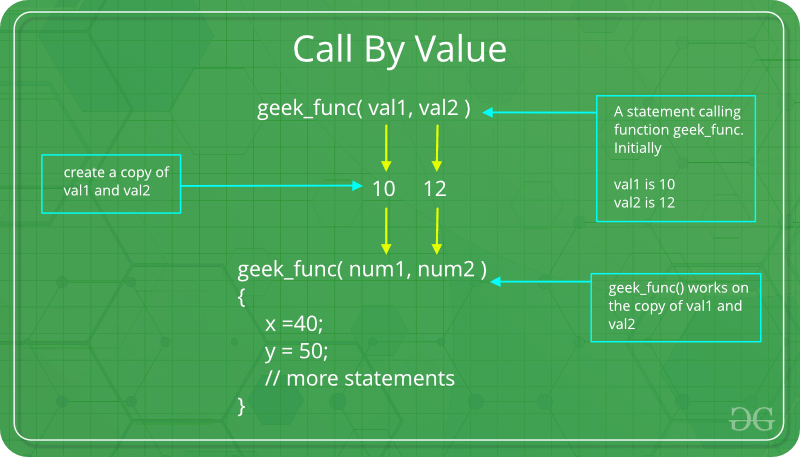Parameter Passing Techniques in C
Last Updated :
11 Jan, 2024
In C, there are different ways in which parameter data can be passed into and out of methods and functions. Let us assume that a function B() is called from another function A(). In this case, A is called the “caller function” and B is called the “called function or callee function”. Also, the arguments which A sends to B are called actual arguments and the parameters of B are called formal arguments.
Terminology
- Formal Parameter: A variable and its type as it appears in the prototype of the function or method.
- Actual Parameter: The variable or expression corresponding to a formal parameter that appears in the function or method call in the calling environment.
- Modes:
- IN: Passes info from caller to the callee.
- OUT: Callee writes values in the caller.
- IN/OUT: The caller tells the callee the value of the variable, which the callee may update.
Methods of Parameter Passing in C
There are two ways in which we can pass the parameters to the function in C:
1. Pass By Value
This method uses in-mode semantics. Changes made to formal parameters do not get transmitted back to the caller. Any modifications to the formal parameter variable inside the called function or method affect only the separate storage location and will not be reflected in the actual parameter in the calling environment. This method is also called call by value.

Example of Pass by Value
The below example demonstrates pass by value in function.
C
#include <stdio.h>
void func(int a, int b)
{
a += b;
printf("In func, a = %d b = %d\n", a, b);
}
int main(void)
{
int x = 5, y = 7;
func(x, y);
printf("In main, x = %d y = %d\n", x, y);
return 0;
}
|
Output
In func, a = 12 b = 7
In main, x = 5 y = 7
Shortcomings of Pass By Value:
- Inefficiency in storage allocation
- For objects and arrays, the copy semantics are costly
Note: Languages like C, C++, and Java support this type of parameter passing. Java in fact is strictly call by value.
C doesn’t support call by reference.
2. Pass by Pointers
This technique uses a pointer. In function we pass memory address (pointer) of a variable rather than passing the actual value of variable. This passing technique allows the function to access and modify the content at that particular memory location.
Example of Pass by Pointers
C
#include <stdio.h>
void modifyVal(int* myptr)
{
*myptr = *myptr + 5;
}
int main()
{
int x = 5;
int* myptr = &x;
modifyVal(myptr);
printf("Modified value of x is: %d\n", x);
return 0;
}
|
Output
Modified value of x is: 10
Shortcomings of Pass by Pointers
- Pointers can be null so null pointer Issues arises if properly not checked.
- If more than one pointers point to the same memory location then changes made by one pointer affect other the other pointers which points to same memory location.
- memory management should be done effectively using function like malloc and free.
Other Methods of Parameter Passing
These techniques are older and were used in earlier programming languages like Pascal, Algol, and Fortran. These techniques are not applicable in high-level languages.
1. Pass by Result
This method uses out-mode semantics. Just before control is transferred back to the caller, the value of the formal parameter is transmitted back to the actual parameter. This method is sometimes called call by the result. In general, the pass-by-result technique is implemented by copying.
2. Pass by Value-Result
This method uses in/out-mode semantics. It is a combination of Pass-by-Value and Pass-by-Result. Just before the control is transferred back to the caller, the value of the formal parameter is transmitted back to the actual parameter. This method is sometimes called call by value-result.
3. Pass by Name
This technique is used in programming languages such as Algol. In this technique, the symbolic “name” of a variable is passed, which allows it both to be accessed and updated.
Example
To double the value of C[j], you can pass its name (not its value) into the following procedure.
procedure double(x);
real x;
begin
x:=x*2
end;
In general, the effect of pass-by-name is to textually substitute the argument in a procedure call for the corresponding parameter in the body of the procedure. Implications of Pass-by-Name mechanism:
- The argument expression is re-evaluated each time the formal parameter is passed.
- The procedure can change the values of variables used in the argument expression and hence change the expression’s value.
If you like GeeksforGeeks and would like to contribute, you can also write an article using contribute.geeksforgeeks.org or mail your article to contribute@geeksforgeeks.org. See your article appearing on the GeeksforGeeks main page and help other Geeks.
Please write comments if you find anything incorrect, or you want to share more information about the topic discussed above.
Share your thoughts in the comments
Please Login to comment...